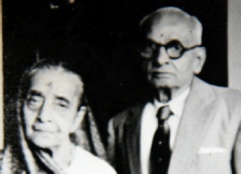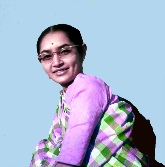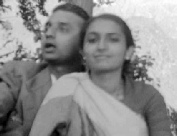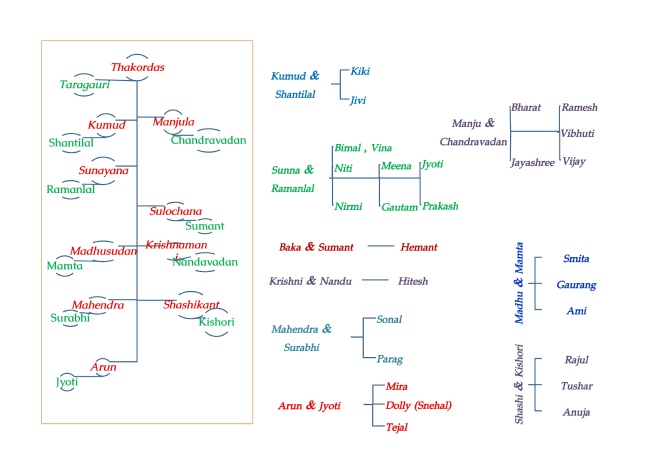Thakordas and Taragauri left Surat and came to Bombay around 1907-8 – so I learnt from Mahendra-ma ma. Dadaji – as I called him – worked for Standard Oil till 1928 and joined Metro theatre, only to retire in 1948 following a very mild paralysis attack. I am making a unverified connection that since papa was also in Metro theatre till 1948, dadaji must have known him from work! The Tijoriwala family also had 9 children, 5 girls, 4 boys, with mummy as girl 4. Kumud the eldest, Manjula, Sunayana, Sulochana (a.k.a. Bakaa), Madhusudan, Krishnamani, Mahendra, Shashikant and Arun. All married into Bombay families, and settled in Bombay too. There was a bit of a unusual story of Motibaa’s (Taragauri) family. Her father – Maganlal Mal – had married a second time, but his second wife was a little younger than Motibaa! And they were more like friends after Maganlal passed away. She had a large family too, but I knew only the five maasi's. There were a few more of mummy's Tijoriwala clan cousins who I knew, including papa's bosom friend Jaidevkaka, and later Premal - who is my peer - who became part of our mountains and nature lovers gang too, and has continued to sustain that love.
ma. Dadaji – as I called him – worked for Standard Oil till 1928 and joined Metro theatre, only to retire in 1948 following a very mild paralysis attack. I am making a unverified connection that since papa was also in Metro theatre till 1948, dadaji must have known him from work! The Tijoriwala family also had 9 children, 5 girls, 4 boys, with mummy as girl 4. Kumud the eldest, Manjula, Sunayana, Sulochana (a.k.a. Bakaa), Madhusudan, Krishnamani, Mahendra, Shashikant and Arun. All married into Bombay families, and settled in Bombay too. There was a bit of a unusual story of Motibaa’s (Taragauri) family. Her father – Maganlal Mal – had married a second time, but his second wife was a little younger than Motibaa! And they were more like friends after Maganlal passed away. She had a large family too, but I knew only the five maasi's. There were a few more of mummy's Tijoriwala clan cousins who I knew, including papa's bosom friend Jaidevkaka, and later Premal - who is my peer - who became part of our mountains and nature lovers gang too, and has continued to sustain that love.
Mummy (born 1916) married late (for those times!) at 28, so all her sisters had gone off to their marital homes, leaving mummy to look after all the brothers who were still studying. Mummy had matriculated from high school, and had started working as a teacher in the primary section of Modern School. I am guessing around 1932-33, 1916 + 5 + 11. The family lived in a “chawl” system in 3 contiguous rooms. The complex had a large quadrangle in between. A Post Office block stood on one side, with a primary school in the upper stories! Our house on Wilson street was close by - hardly a 4 minute walk. Kumud maasi and Manju maasi lived near by as well, but Sunna maasi was farthest at Borivali and Krishni maasi at Parla, halfway to Borivali. Mummy, Kumud maasi and Manju maasi would visit baa every second day, and Sunna maasi Krishni maasi would make it once a week. My primary school was the one above the Post Office. Whenever mummy was visiting baa, I would go there after school. Baa would keep the Prasad “baaU” of that morning for me; no one else was allowed to touch it.
Mummy was a worker bee and queen bee combined together. Calls to “Bakaa” were almost mandatory for Manju and Krishni maasi and the mami’s. Few events would kickoff without mummy involved. I knew the entire Tijoriwala clan very well, particularly the mama’s and maami’s of who, there were 4 each! However, mummy had a cousin brother – Harshad - who was very close to the family, and was simply the 5th brother. I believe his father had passed away early in life and dadaji had taken care of the children (two sisters as well) there after. The children of all the maasi’s were a lot older than me, but children of all the mama’s were either my age plus minus or younger. Madhu mama’s Gaurang and Smita and Harshad mama’s Anil and Rupa were my closest playmates all through to college. We 5  were inseparable! Whenever baa organised a celebration the gathering would easily be over 40 people! Once the main celebration: lunch, was done at baa’s house, the children would move to our house – which was quite large - for general mayhem. If it was a weekend, Arun mama, Harshad mama and papa were 3 and would rope in mummy as the fourth, for a night long session of contract bridge! Arun mama – the youngest – had a large circle of very good friends, and if he wanted to go out with them, they had to ask mummy (often to fund Arun mama, like she did for the other mama’s too.) All the friends considered mummy their elder sister too, and that relationship has outlived each of the participants too, with many of their children in touch with one another. Mama’s group of 6 had 2 engineers, and four doctors.
were inseparable! Whenever baa organised a celebration the gathering would easily be over 40 people! Once the main celebration: lunch, was done at baa’s house, the children would move to our house – which was quite large - for general mayhem. If it was a weekend, Arun mama, Harshad mama and papa were 3 and would rope in mummy as the fourth, for a night long session of contract bridge! Arun mama – the youngest – had a large circle of very good friends, and if he wanted to go out with them, they had to ask mummy (often to fund Arun mama, like she did for the other mama’s too.) All the friends considered mummy their elder sister too, and that relationship has outlived each of the participants too, with many of their children in touch with one another. Mama’s group of 6 had 2 engineers, and four doctors.
I used to go to Sunna maasi’s place quite often. They used to live in an old style mansion in the middle of an Ambavaadi – mango orchard in Borivali. Borivali had old bungalows all around, and open drains by the side of the road. Andheri was already considered “outside” the city, and Borivali was the boondocks! Very rustic style of living. A well behind the house, an outhouse in a corner of the orchard, a servants quarters converted to store and kitchen by the side of the main house. Draw water from the well, bathe on the spot during summer, fill up a hot water stove, and cart buckets around for bathing. The orchard also had lychee, chikoo, tamarind, coconut and jambu trees. Maasi’s family were tenants, so all produce of the orchard belonged to the land lord, who had a live-in gardener in the place. Sunna maasi’s household was also large: four daughters, three sons, one of them married with a son my age. Sleeping at night was fun. A large number of mattresses were laid out in a large hall on the second floor. In the balcony during summer. And all the unmarried kids slept on whichever mattress was free! Either papa or mummy or both would come on Sunday evenings to take me back home. Winters were cool, and monsoon would flood the orchard, and we had to look out for snakes if we wanted to go to the outhouse at night - lantern in hand!
After baa’s demise – dadaji had gone earlier – the family still got together to celebrate Janmashtami, Dev-Diwali (tulasi vivah) and raksha-bandhan. Four families had consecrated deity’s who would be brought over to gather at one house, and celebrate the festival. The preparation for the multitudes of prasad’s was a day long affair, and all the women including daughters would gather and pitch in, under Manju maasi’s supervision. Mahendra mama had taken over the Ganapati duty after dadaji. Raksha- bandhan day was also Shashi mama’s birthday.
The footpath of the street where we lived was our play area. There was an Aarey Milk booth, which became our stumps and underhand bowling cricket was ON! Weekends were for sneaking into the compound of the Wilson School next door. I used to go to baa’s house quadrangle to play with Gaurang and Smita. The three of us learnt swimming and cycling together. Madhu mama had the first car in the family. He would load Gaurang Smita into the car, and come over to our street, and honk under our window. I would charge down, and off we went to Mafatlal swimming pool, or to Hanging gardens. Smita soon went off to the separate ladies pool. One weekend a month would be spent at Harshad mama’s place. His house had a front garden, good for cricket, and a couple of bitter neem trees, which were perfect to set up a rope swing! The street was a dead end one, terminating at the sea front hardly 100 meters away. Sunday mornings were a dip in the sea (caution: the sea and the beach were clean and usable 60 years ago… not so for the past 40 years!) castles in the sand and wash up before lunch, then nap and home! Anil, Rupa, Gaurang, Smita and me!
All the brothers moved to their own apartments after baa and dadaji passed away, and contact between families did reduce significantly. We too had moved to a modern but tiny apartment. We became closer to Arun mama and Jyoti mami, mainly because they started joining us on our nature trips, and they signed into that ho bby with great enthusiasm. Their first daughter Meera was particularly close to mummy, and during her illness, she would eat only if Bakaa foi cooked her favourite dish and fed her! Arun mama would bring her over quite often those days. Occasionally, Arun mama and his friends would gather at our house on Saturday evenings, and play bridge all night long, yelling and scolding poor play or missed opportunity! Winter would see us meeting mama mami and the girls on Grant Road station at 6 a.m. catch the Virar fast train, reach Borivali by 6:50, rush to the bus terminus, catch the first bus to Kanheri caves, request the driver to drop us off near a forest path before the caves, and our half day nature jaunt would begin! Both: bhabhi and naNand (bidirectional sister-in-laws) would soon be whisper screaming as various birds were spotted on the walk into the forest.
bby with great enthusiasm. Their first daughter Meera was particularly close to mummy, and during her illness, she would eat only if Bakaa foi cooked her favourite dish and fed her! Arun mama would bring her over quite often those days. Occasionally, Arun mama and his friends would gather at our house on Saturday evenings, and play bridge all night long, yelling and scolding poor play or missed opportunity! Winter would see us meeting mama mami and the girls on Grant Road station at 6 a.m. catch the Virar fast train, reach Borivali by 6:50, rush to the bus terminus, catch the first bus to Kanheri caves, request the driver to drop us off near a forest path before the caves, and our half day nature jaunt would begin! Both: bhabhi and naNand (bidirectional sister-in-laws) would soon be whisper screaming as various birds were spotted on the walk into the forest.
Mahendra mama’s house was just across the road from ours. Mummy and Surabhi mami would invariably help each other for all events and celebrations at our respective houses.
Spring was “stock up for the year” time. Pickles and preserves for the whole year, hair oil from herbs, stock wheat, rice, lentils and such grains and spices for the year. A family session would be set up at our place, and various maasi’s, mami’s and neighbours would pitch in. Pickles would be chopped mangoes coated with salt and turmeric – which made the mangos release a lot of juices – pull out and spread on our terrace to be dried in the sun, with me as the scarecrow. “garmar” (a ginseng look alike root) would be pickled in the mango juices. Hair oil was another enterprise. Mummy and often Manju maasi would be in charge!
All the sisters would tease Shashi mama by calling him “Kanhaiyo” – as in Krishna sparking many gopi’s. He was handsome looking, and had a good singing voice. Girls did give him a longer look. All this disappeared after he married Kishori mami, who was a professor in a local college. The couple on their honeymoon, had joined u s for part of our trip to Kashmir in 1956.
s for part of our trip to Kashmir in 1956.
With so many cousins from both sides of the family, I had a large number of sisters. Raksha bandhan day saw my toddler arm full to the elbow with rakhadi’s. Mummy used to actually schedule two or three groups in the day.
Papa and mummy hardly spent a weekend home, and were always off to a nature trip near and around Bombay. He would convince any and all of mummy’s family – including baa – to join the adventure. I have a photo of baa with one such group on the flow control platform of some dam near Bombay.
I could go on and on.. but enough said, I think.



 પહેલું પાનું The Beginning
પહેલું પાનું The Beginning
 ma. Dadaji – as I called him – worked for Standard Oil till 1928 and joined Metro theatre, only to retire in 1948 following a very mild paralysis attack. I am making a unverified connection that since papa was also in Metro theatre till 1948, dadaji must have known him from work! The Tijoriwala family also had 9 children, 5 girls, 4 boys, with mummy as girl 4. Kumud the eldest, Manjula, Sunayana, Sulochana (a.k.a. Bakaa), Madhusudan, Krishnamani, Mahendra, Shashikant and Arun. All married into Bombay families, and settled in Bombay too. There was a bit of a unusual story of Motibaa’s (Taragauri) family. Her father – Maganlal Mal – had married a second time, but his second wife was a little younger than Motibaa! And they were more like friends after Maganlal passed away. She had a large family too, but I knew only the five maasi's. There were a few more of mummy's Tijoriwala clan cousins who I knew, including papa's bosom friend Jaidevkaka, and later Premal -
ma. Dadaji – as I called him – worked for Standard Oil till 1928 and joined Metro theatre, only to retire in 1948 following a very mild paralysis attack. I am making a unverified connection that since papa was also in Metro theatre till 1948, dadaji must have known him from work! The Tijoriwala family also had 9 children, 5 girls, 4 boys, with mummy as girl 4. Kumud the eldest, Manjula, Sunayana, Sulochana (a.k.a. Bakaa), Madhusudan, Krishnamani, Mahendra, Shashikant and Arun. All married into Bombay families, and settled in Bombay too. There was a bit of a unusual story of Motibaa’s (Taragauri) family. Her father – Maganlal Mal – had married a second time, but his second wife was a little younger than Motibaa! And they were more like friends after Maganlal passed away. She had a large family too, but I knew only the five maasi's. There were a few more of mummy's Tijoriwala clan cousins who I knew, including papa's bosom friend Jaidevkaka, and later Premal - were inseparable! Whenever baa organised a celebration the gathering would easily be over 40 people! Once the main celebration: lunch, was done at baa’s house, the children would move to our house – which was quite large -
were inseparable! Whenever baa organised a celebration the gathering would easily be over 40 people! Once the main celebration: lunch, was done at baa’s house, the children would move to our house – which was quite large -
 s for part of our trip to Kashmir in 1956.
s for part of our trip to Kashmir in 1956.